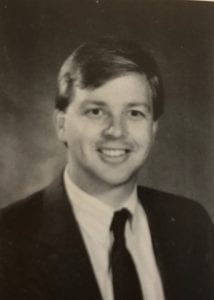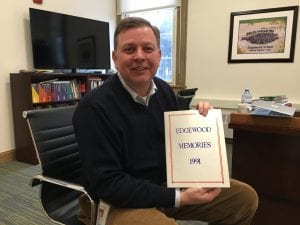At his first Edgewood Picnic, a tradition that was already in place, he made a point of being visible to parents and students — and accessible. He tried to meet as many members of the community as he could and approached students to ask them about themselves. “The kids always told me I was all over the place trying to be everywhere at once, and it was true,” he says.
A young idealist in his mid-30s, Dr. Houseknecht says he didn’t want to get caught up in a principal’s administrative duties all day. He’d earned his doctorate in education so he could spend time with kids and make a difference in their lives, so that’s what he tried to do: He walked the school hallways, stopped into the library and gymnasium, sat with students and asked about what they were learning. He began organizing more assemblies to promote school spirit.
During his first year, he also started what would go on to be one of his proudest achievements: the Student Involvement Council, a student government program, to help develop students’ leadership skills and give kids a say in school decisions and policies. “Teachers didn’t seem to care if I pulled kids out of the classroom as long as it wasn’t during lesson time,” he says, “so we decided to meet during lunch.”
He says that the Student Involvement Council has had as much of an impact on the Edgewood faculty as it has on students.
“It keeps us honest and balanced,” he says. “It encourages us to check in with kids and reminds us that this school is about them.” Student Involvement Council still meets during lunch about eighteen times during the school year, and over the years, Dr. Houseknecht says he uses it to test ideas and gain feedback from the kids.
At the end of his first year at Edgewood, he asked students on the Council to list the twenty best parts of their school year. He was surprised what turned up: a fourth grade science test (this shocked him), activities where the kids were able to manipulate objects, field trips (less surprising). He’s gone on to ask kids to talk about the best parts of their school year every year since. He finds it helpful when it comes to informing his job and those of his colleagues. “It helps us see the school day from the child’s point of view,” he says. “We often take what we hear and consider how to incorporate more of it into the school day.”


